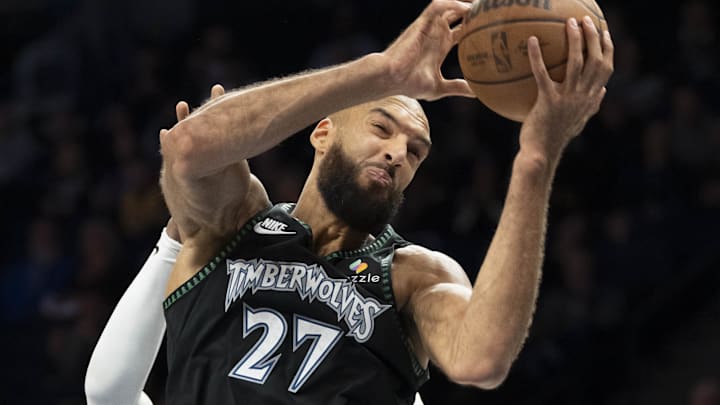Rudy Gobert's slow start has been a notable story for the Minnesota Timberwolves amid a 2-3 start. Gobert is averaging just 8.6 points, 8.4 rebounds, and 1.4 blocks. His points and rebounds are the lowest since his second year. Plus, his 5.0 field goal attempts are the lowest since his rookie year, when he averaged under 10 minutes per game. Gobert's lack of offensive impact has been amplified with Anthony Edwards being sidelined with a hamstring injury.
Considering Gobert's age (33) and similarly lackluster impact in the playoffs, it's fair to believe this decline, especially on offense, is real. While he's had some nice moments on defense and the on-off numbers are still elite, Gobert hasn't been the Defensive Player of the Year caliber rim protector we saw two years ago. Frankly, he hasn't even looked like an All-Defensive level player.
Gobert's decline is far from the only reason why the Wolves have gotten to a slow start, but it's certainly one, and as the season goes on, it could continue to haunt the Wolves.
Gobert is declining on offense
We will discuss Gobert's defense later (which is largely still positive), but there's no denying that Rudy is declining offensively. With Gobert on the court, the Wolves have a 107.7 offensive rating (equivalent of 27th in the league), but when he sits, they have a 121.1 ORTG (fourth in the league). A 23-spot swing is significant. Even two years ago, Gobert had a +4.3 offensive swing despite not being that skilled a scorer.
With Gobert on the court, it sometimes looks like they are playing four on five. This might sound harsh, and I don't want to disrespect a future Hall of Famer. Nevertheless, he is so limited as a scorer and is rarely involved in the offense.
Gobert is an elite screener, but he doesn't roll well to the basket. His hands have long been an issue, and so far, he is averaging the same amount of turnovers as assists (1.2). Notably, 3.2 of Gobert's 8.4 rebounds are on the offensive end, and seven out of his 17 field goals are on off putbacks.
Having the increased spacing of Julius Randle and Naz Reid clearly benefits the Wolves. Another option is to play McDaniels at the four; both options have been far more effective for the Wolves.
Gobert's defense is mostly still stellar
The biggest argument in favor of Gobert is that his rim protection remains impactful. Per NBA.com, with Gobert on the court, the Wolves have a 111.6 defensive rating (equivalent of 11th in the league), but without him, they have a 133.3 DRTG (dead last in the league).
Gobert can still anchor a high-quality defense, and he is an elite rim deterrent. Overall, Gobert is holding opponents to 46.5 percent from the field and 38.5 percent at the rim. These numbers are truly stellar.
However, it's worth noting that Gobert's 13.8 field goals defended per game is his lowest in 10 years. Furthermore, mobility has never been Gobert's strength, and this has been more noticeable this year. At times, teams have punished his drop coverage, with Luka Dončić shooting 71.4 percent against Gobert last Friday. He has gotten worse at guarding in space and on switches. It would be foolish to argue that Gobert is suddenly a bad defender, but he has declined in this area as well.
Ultimately, Gobert's still high-level yet declining defense, paired with his offense falling off a cliff, puts the Wolves in an impossible position.
